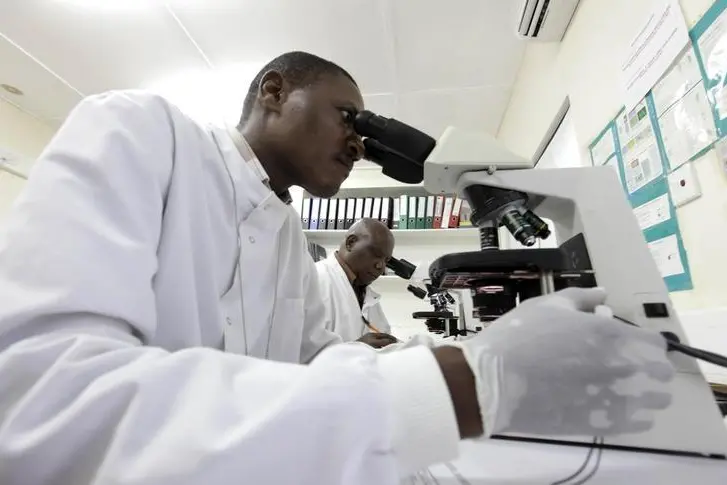PHOTO
According to the World Malaria report 2021, Nigeria alone contributed about 27% of the global malaria cases and 27% of global malaria deaths, making it the country with the highest number of cases and deaths globally.
Nigeria also recorded an increase in the proportion of deaths attributable to malaria from 23% in 2020 to 27% in 2021 as reported by the World Health Organization, making malaria a foremost public health challenge for Nigeria and a major cause of morbidity and mortality, which government should be determined to change.
The Minister of Health, Dr Osagie Ehanire, at the commemoration of the 2022 World Malaria Day in Abuja, however, said through years of concerted efforts by government and partners in malaria programme implementation across the country, several programme indicators witnessed an upward trend.
Ehanire disclosed that utilization of insecticidal nets amongst Under 5 children increased from 43.4% (2015) to 52% (2018) while that amongst pregnant women increased from 49% (2015) to 58% (2018).
The Minister said fever testing amongst children under 5 increased from 5% in 2010 to 11% in 2013, to 13% in 2015 and 14% in 2018; but is still very low and calls for more efforts to address.
“Nigeria also witnessed a reduction in malaria prevalence from 42% (2010) to 27% (2015) to 23% (2018). We expect that when the results of the 2021 Malaria Indicator Survey are out, we will see a further downward trend”.
“We shall continue to work hard to ensure that we achieve a parasite prevalence of less than 10% and reduce mortality attributable to malaria to less than 50 deaths per 1,000 live births by 2025, a target we set out in the National Malaria Strategic Plan 2021 to 2025”.
Ehanire further maintained that the COVID-19 pandemic considerably impacted the health sector while in the last three years, it led to alterations both in health-seeking behaviour and lifestyle of the populace as well as in programme implementation.
“However, government through the National Malaria Elimination Programme (NMEP), and with support of partners sustained provision of life-saving malaria interventions through the COVID-19 period”.
“Mass distribution of Long-lasting Insecticidal Nets (LLINs) and Seasonal Malaria Chemoprevention (SMC) medications to eligible children in targeted states, for example, continued unabated and even scaled up in some Cases”.
“Some implemented in collaboration with our malaria partners in the past 12 months, to assure continuous offer of and access to malaria services”.
“The programme conducted high-level advocacies to several States and successfully secured counterpart fund from State Governments for LLINs campaigns that were conducted in Jigawa, Ogun, Gombe, Oyo and Yobe States in 2021 and Nasarawd, Kano, Taraba and Delta scheduled for 2022, among others”.
“Similarly, NMEP, in collaboration with its partners, developed audio and video spots for the launch of the ‘’Mama Put” fever care media campaign at National level, and supported the social media and television rollout of the video clips. The comic is meant to provide information to improve health-seeking behaviour and proper diagnosis and treatment of malaria, using the recommended Artemisinin-based Combination treatment (ACTs)”.
“The Seasonal Malaria Chemoprevention (SMC) intervention has proven to be a veritable intervention for malaria prevention in children under 5 years of age”.
“To this end, we increased the number of covered States from 9 to 21, using scientific evidence from a stratification exercise conducted to ensure that vulnerable children in the local government areas of Nigeria are adequately protected during peak malaria transmission season”.
Similarly, the Minister of State for Health, Dr Olorunnimbe Mamora said the theme for this year’s World Malaria Day celebration, which is “Advance Equity. Build Resilience. End Malaria” is a global call for all endemic countries in particular to build systems that will ensure sustainabilty in malaria control efforts towards achieving the ultimate goal of elimination and eradication.
“It therefore encourages alll Nigerians to take a stand and ensure that, individuals no longer remain passive in the malaria elimination drive”.
“While government continues to drive the global and national efforts to eliminate the disease, as individuals and communities, we must consciously adopt common practices, such as keeping our surroundings clean, ensuring we sleep inside treated bednets each night, and seek prompt diagnosis and treatment for suspected malaria to prevent complications that may lead to death”.
Copyright © 2022 Nigerian Tribune Provided by SyndiGate Media Inc. (Syndigate.info).




















